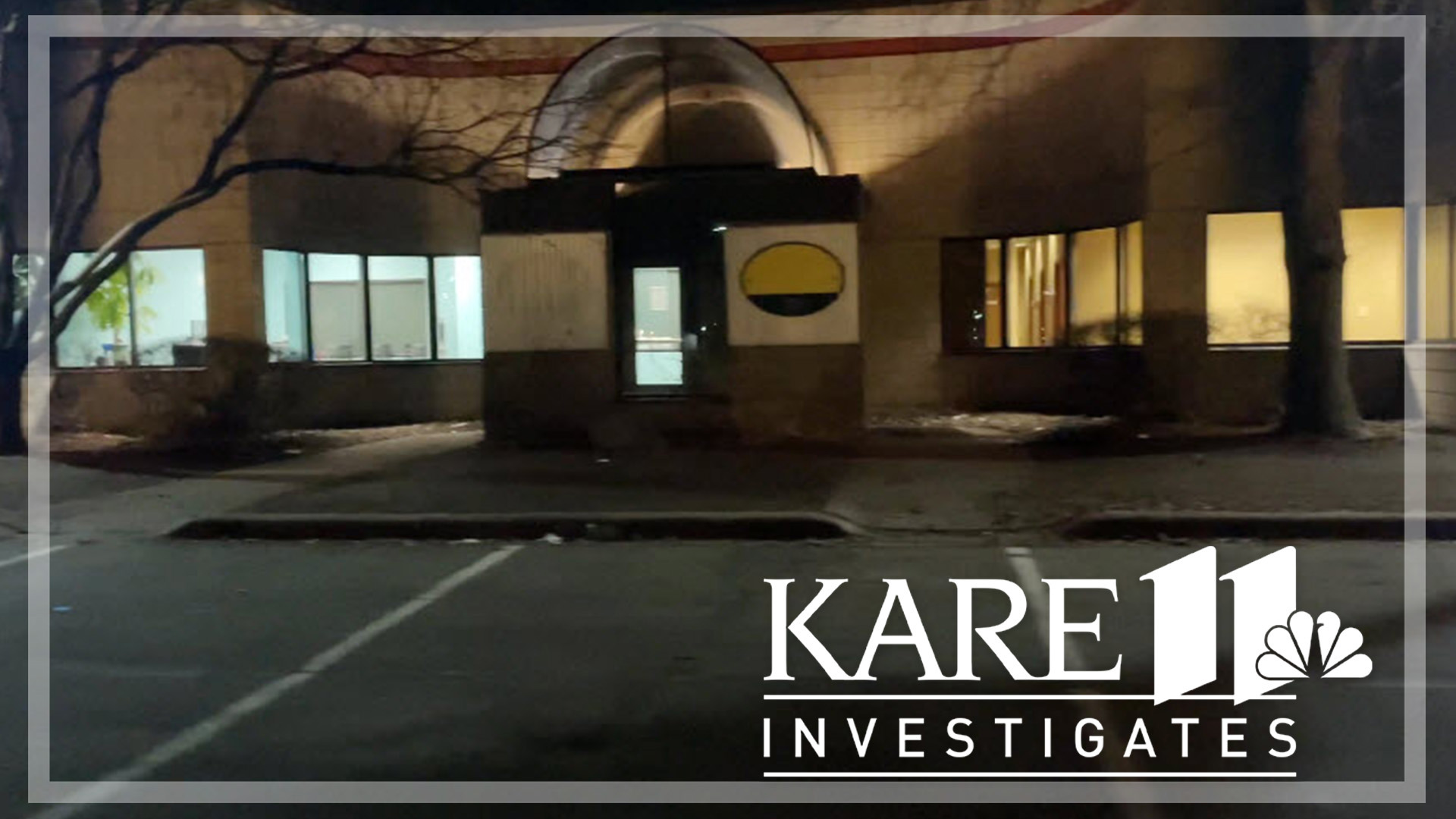KARE 11 Investigates: Addiction treatment center billed taxpayers for 203 hours of work by one employee in single day
With millions of dollars at stake, former workers and clients accuse Evergreen Recovery of falsifying records and overbilling taxpayers for addiction services.
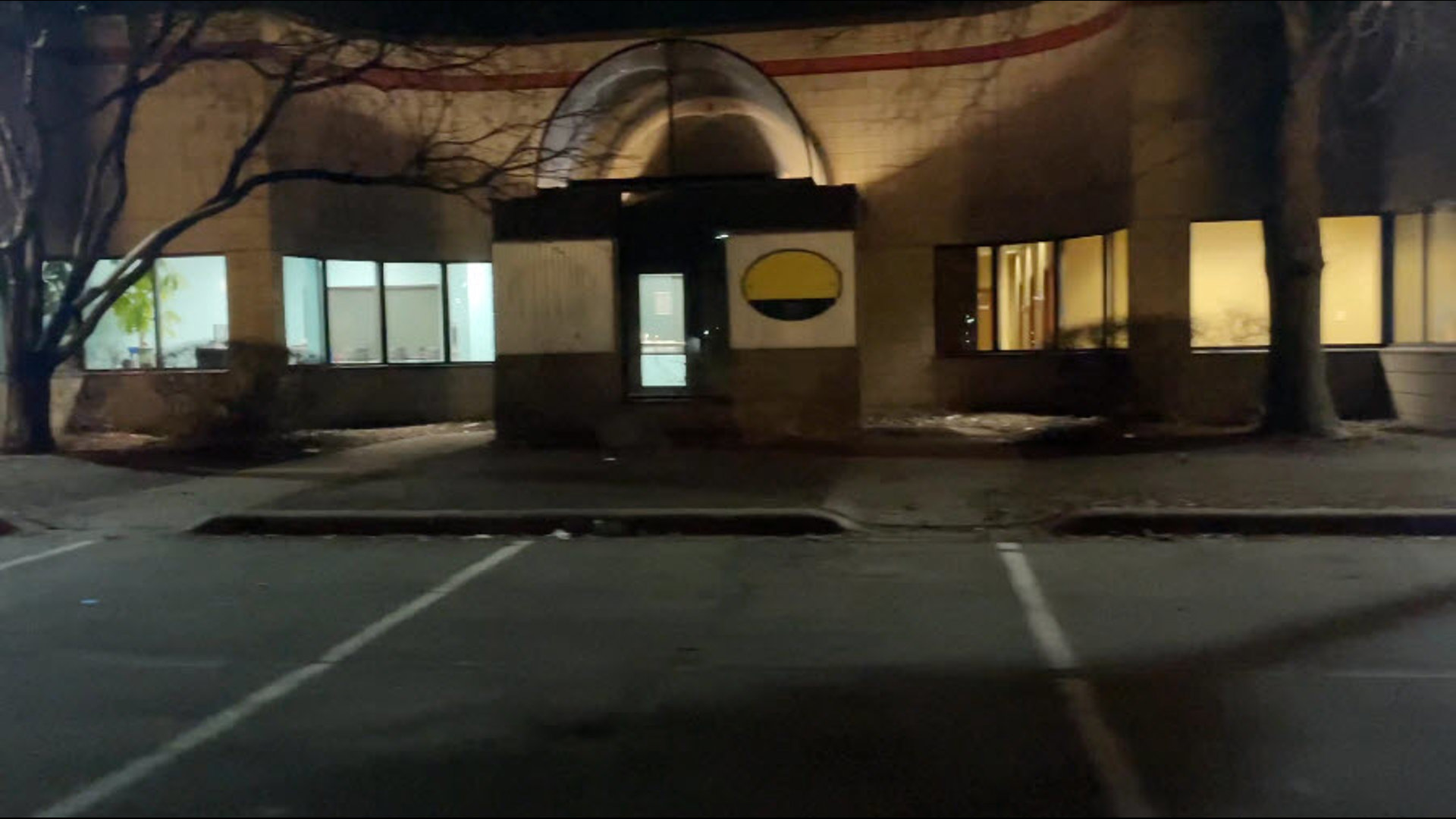
“I’ve spent many sleepless nights,” Lea Jondal explained.
What’s been keeping Jondal up is a story she’s now driven to tell.
“I hate to be labeled as the whistleblower,” she told KARE 11, “but it had to happen.”
Jondal is one of the former workers and clients who accuse Evergreen Recovery, a St. Paul addiction treatment center, of overbilling.
They accuse the company of improperly billing taxpayers for phone calls with clients, falsely billing group activities as if they were a series of individual interactions, and overstating the times spent on van rides to and from recovery treatment.
In one case, records obtained by KARE 11 show Evergreen billed taxpayers for 203 hours of peer support services supposedly worked by a single employee in a single day.

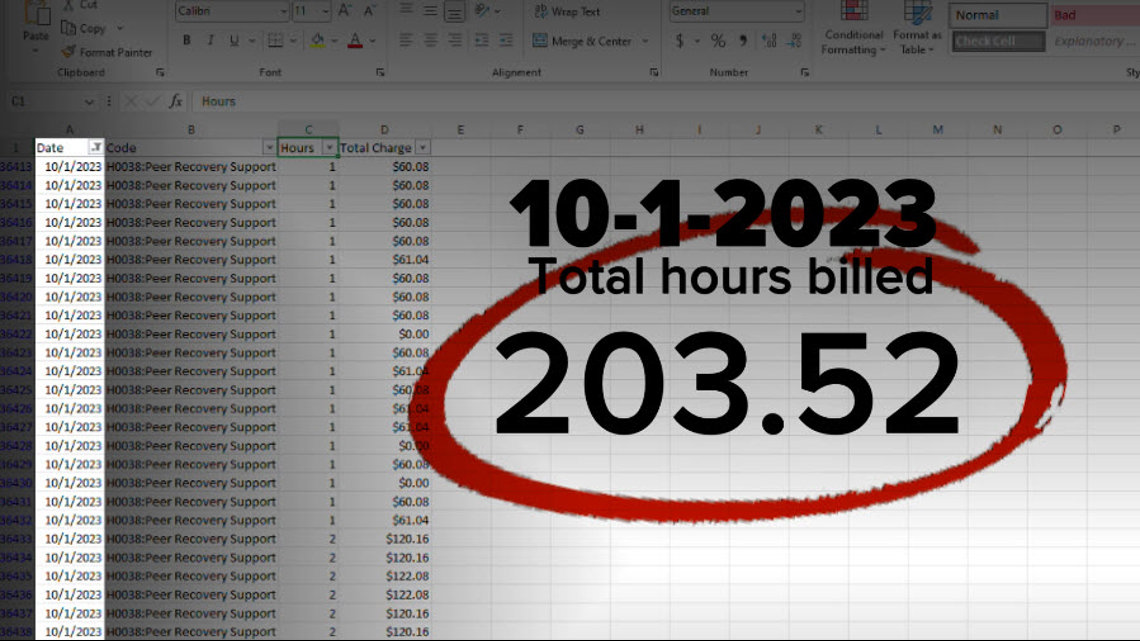
Records show Evergreen’s practices have allowed them to rake in millions of dollars a year for peer services since they first started billing in September of 2021 – more than twice as much as any other licensed addiction recovery program in the state during the same period.
Evergreen officials denied they’ve deliberately done anything improper.
Although Evergreen’s attorney sent two “Cease & Desist” letters alleging unethical conduct by KARE 11’s reporters such as digging through the facility’s trash. KARE 11 denied any improper conduct and continued reporting.
Allegedly falsified phone records
Lea Jondal was hired at Evergreen in September 2023 as a peer recovery specialist. She says she hoped it would be a way to put her own recovery journey to work helping others.
Jondal says she was assigned at first to the attendance office. Her main job each day was to take a list of people who didn’t show up for group treatment and call to remind them to come in.
“The only time that I contacted clients was over the phone,” she said.

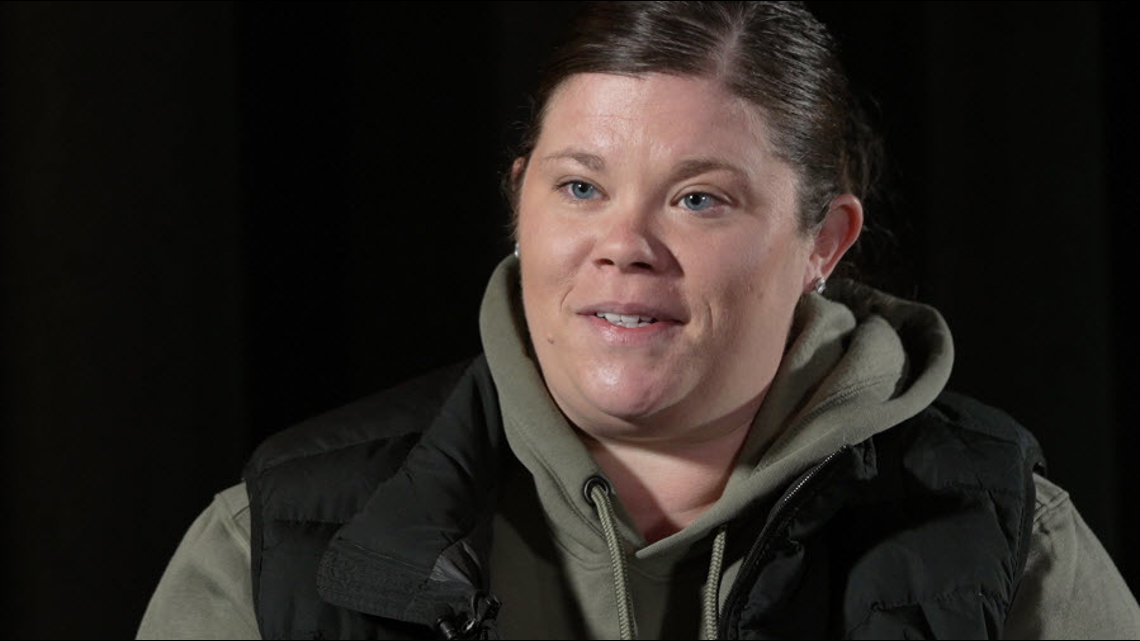
Most Evergreen clients are on Medicaid – the taxpayer funded insurance program for the poor and disabled – which pays a dollar a minute for peer services.
According to state law, peer services currently must be provided one-to-one and in person – with limited exceptions for phone calls. Regulations say peers can only bill Medicaid for phone calls in two scenarios:
- The appointment is prescheduled.
- Or if the client calls in an emergency or crisis.
Despite those restrictions, Jondal says she was told to bill for every call.
“Every phone call I made they had me chart,” she said.
It wasn’t until after watching KARE 11’s “Recovery Inc.” investigation exposing similar behavior by a tech company called Kyros and its nonprofit partner Refocus Recovery that Jondal says she learned those phone calls are not supposed to be billed to Medicaid at all.
Jondal already thought the way she’d been instructed to document the calls was wrong. She shared her records with KARE 11. Names were blacked out to protect client privacy.
Jondal says the billing times listed were all bogus – pre-determined starting at 7 a.m. That’s approximately two hours before she even started her workday.

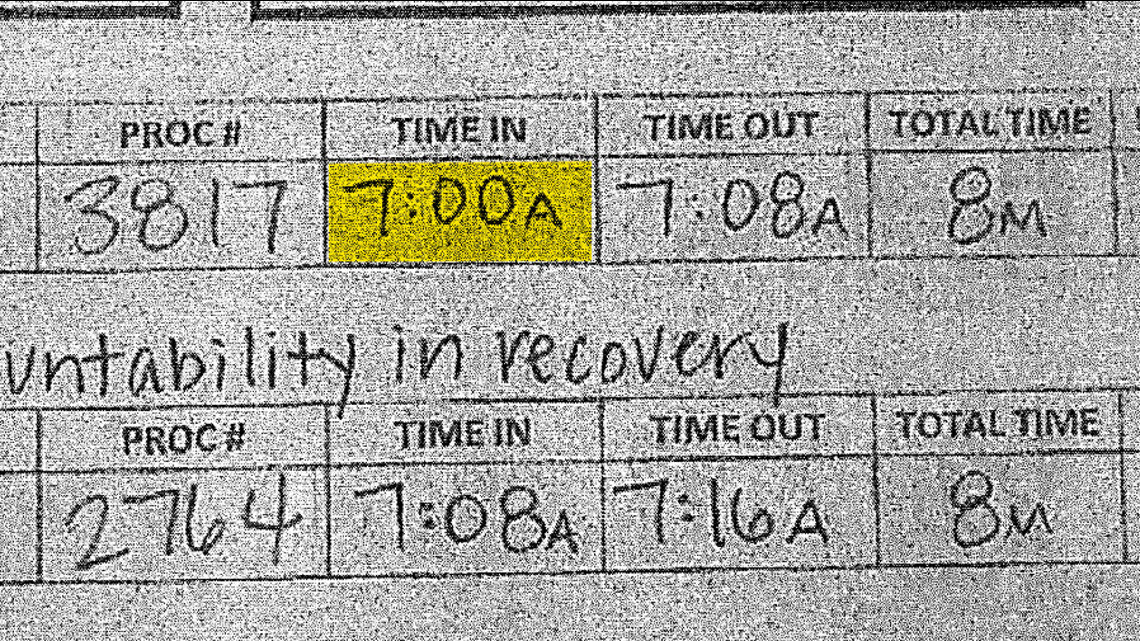
"So, when this record shows that you spoke with a person from 7 to 7:08 – that’s not true?” asked KARE 11’s A. J. Lagoe.
No, Jondal replied. “I was told by my supervisor the timeslots I should chart from.”
“Even though they were made up?” Lagoe asked.
“Yeah. I didn’t start at 7,” Jondal said.
What’s more, the phone calls were listed back-to-back, each one supposedly lasting exactly 8 minutes. Peer support services are billed to Medicaid in 15-minute “units” – and anything 8 minutes or longer can be rounded up to a full unit.
So, listing calls as “8 minutes” – or one unit – means Evergreen could bill every call as it if was for the full 15 minutes. That means for every one hour and four minutes of actual time, taxpayers could be billed for two hours of work – nearly double the time allegedly spent.
Reviewing Jondal’s records, Lagoe asked: “By 12:30 you had already charted for 10.5 hours of peer services?”
“Yeah,” she replied.
“Day after day, after day, billing this many hours?” Lagoe asked.
“Yes,” Jondal said, adding, “It got to a point where, even if I left a voicemail, I was supposed to chart for it.”
Jondal says Evergreen gave her a daily quota adding up to 16 hours of billed calls. She says she was told to chart calls even if she never spoke directly with a client.
Evergreen denial – and about-face
Initially, Evergreen officials denied the phone calls ever happened.
“Our peers do not make attendance phone calls,” Evergreen CFO Heather Heim initially said in an interview.
“Our peers are working face-to-face with our clients,” she said.


At the time, she didn’t know KARE 11 already had copies of records listing Jondal’s phone calls.
After KARE confronted Evergreen officials with copies of the records, their story changed.
“I believe there has been phone calls that have been billed,” CEO Shantel Magadanz acknowledged minutes later.
“If you find that phone calls were billed for that are not allowed, will that be repaid?” KARE 11 asked.
“100%,” Magandanz replied.
But Evergreen continued to deny Jondal’s claim that she was instructed to falsify phone call billing records.
“That’s not how we trained her,” Heim said.
“Then why would she be doing it?” KARE asked.
“I don’t have the answer, I was not her direct supervisor,” she replied.
Shortly after that interview, Evergreen’s attorney sent a “Cease & Desist” letter claiming KARE 11 had improperly obtained confidential records. The company has not responded to follow-up questions.


Jondal only worked at Evergreen for three months. She says she quit and blew the whistle to the Minnesota Department of Human Services. Months passed, but she says no one from DHS called her back.
That’s why she decided to talk to KARE 11.
“I did illegal things, but if I don’t come forward about it, I’m just part of the problem.”
Falsified van records
Jondal’s claims about phone calls are just the tip of the iceberg regarding her allegations about falsified records.
“They’re billing for every van ride,” she told KARE 11. “It’s not right.”
She’s talking about a second assignment she occasionally had at Evergreen. She was one of the people who drove a fleet of vans that pick up and drop off clients at Evergreen’s treatment center, stopping at a network of affiliated sober homes.
Clients like Quamari Robinson – who goes by the nickname “Q” – now question how taxpayers were billed for those van rides.
Q went through drug treatment at Evergreen. He says he got clean there and is thankful – but also suspicious.

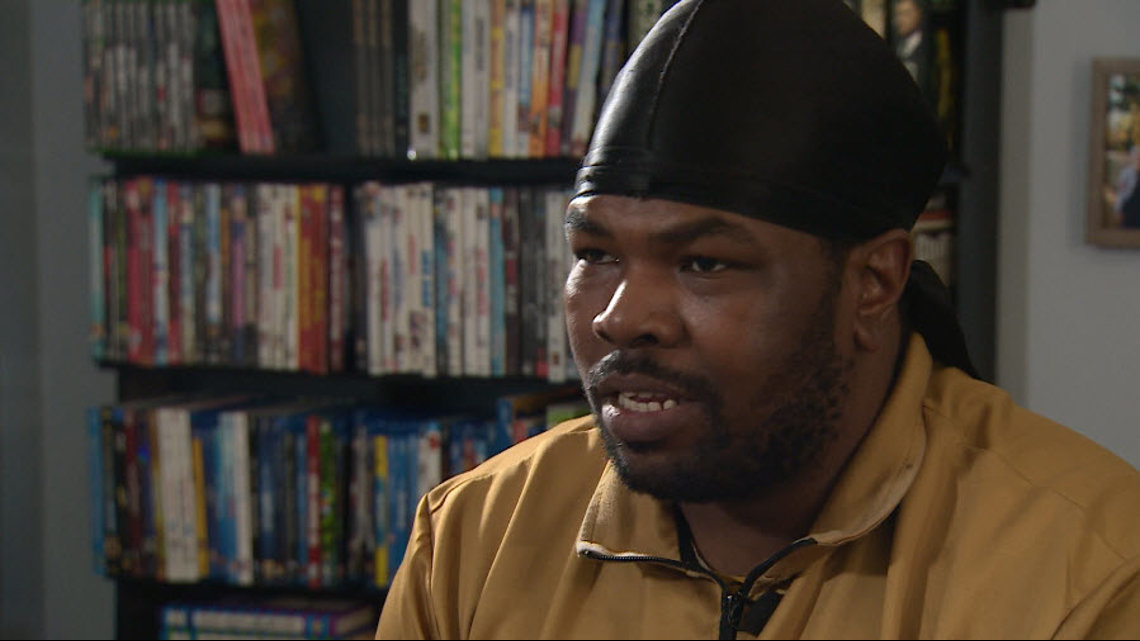
“I have reason to believe that my insurance has been falsely billed by Evergreen Recovery,” he told KARE 11.
His insurance is taxpayer-funded Medicaid. He requested records showing what services were billed in his name – and showed copies to KARE 11.
During the spring of 2022, Q says he lived at an Evergreen-affiliated sober home just 3.1 miles from the treatment facility.
But according to Q’s Evergreen records, every single van ride to and from the treatment center – time after time – was billed to Medicaid as a 45-minute trip.
“Did that trip take 45 minutes?” KARE 11 asked.
“Absolutely not!” Q replied. “Even with hitting every stop light, you would take 15 minutes to get there – tops!”
He’s right. KARE 11 cameras recorded as reporter A. J. Lagoe drove the route – and timed it.
“That took exactly 10 minutes,” Lagoe said as he arrived at Evergreen.
Internal documents describe van trips
Why are the van rides important?
The people driving Evergreen’s vans are certified peer recovery specialists. People like Jondal, who says clients were billed for 45 minutes no matter how long their trip lasted.
“They all got billed 45 minutes, even if they got in the van and they were the last stop and it took 8 minutes to get back to the center,” she said.
“Taxpayers still paid 45 minutes of peer services for that person?” KARE 11 asked,
“Correct,” she replied.

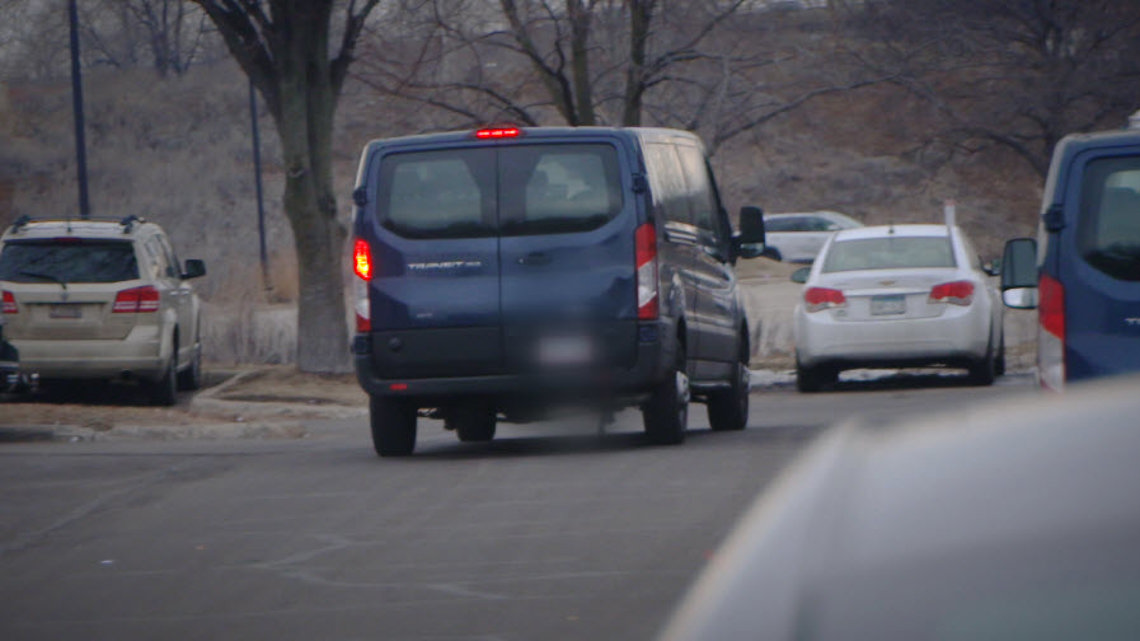
To document her claim, KARE 11 watched – and recorded.
“It’s 5:57 and the van is pulling out of Evergreen,” A. J. Lagoe said, noting the time.
We saw van rides often lasted just minutes.
“It’s 6:01, and the van is making its first stop.”
KARE 11’s cameras documented the stops – and how long it took clients to be dropped off.
“It’s 6:10 and they’re stopping again to let someone out.”
During an interview with Evergreen officials, KARE 11 asked about the van trips.
“How is someone being in the van from Evergreen Recovery to their sober home eight minutes away – 45 minutes’ worth of billable time?”
“That I don’t know,” said David Backus, one of Evergreen’s co-owners.
Even though Backus didn’t know, KARE 11 obtained Evergreen records that explain the practice.
Van drivers like Jondal used Evergreen Recovery log sheets which state: “Below are times that must be used for daily reoccurring activities such as van transportation.”

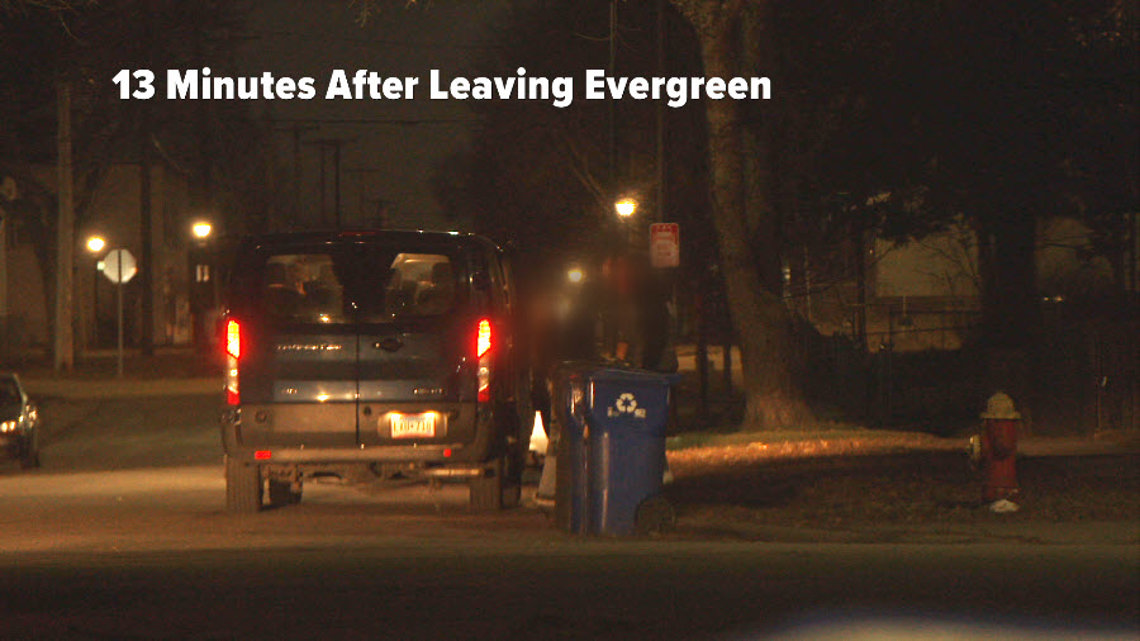
The instructions list 45-minute time frames for the sober home van runs.
“It mandates you fill in 45 minutes for everybody in that van?” KARE 11 asked.
“Yeah, that’s what our bosses told us to do,” Jondal explained.
Four other current and former Evergreen peers, who asked not to be named out of fear of retaliation, confirmed to KARE 11 that they were also instructed to bill every van ride as 45 minutes.
Jondal and the other employees also said peers were ordered to group bill for everyone in the van, contrary to Minnesota law that currently mandates peer services be provided one-to-one.
“One to one is you and me sitting here having a conversation right now, we’re one-to-one,” said Minnesota State University-Mankato Associate Professor Roy Kammer. He served as Executive Director of the Minnesota Certification Board – the agency that credentials peers recovery specialists.
“If it’s me, you, and 10 other people, that’s not one-to-one,” Kammer explained.
Are van rides really one-to-one?
So how is Evergreen getting around that one-to-one requirement?
KARE 11 obtained a copy of Evergreen’s official Charting and Log Guide. It tells peers: “Notes should always be written as service provided to a singular client, even if you are working with several clients at a time, such as providing orientation group.”
Evergreen officials say they think that’s perfectly legal.

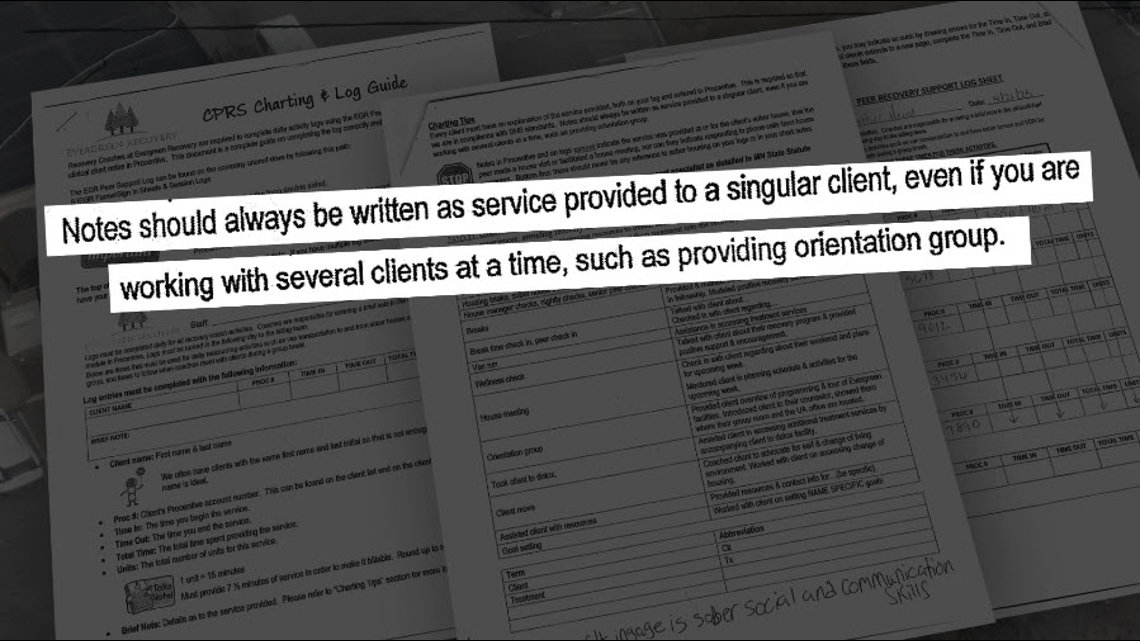
They agreed to an impromptu on-camera interview with KARE 11 in February after they spotted us watching their facility.
“We’re not here to hide anything, we absolutely go painstakingly to operate within the law,” said Evergreen’s David Backus.
Even though the state law about the one-to-one requirement is printed on the front of some Evergreen forms, Backus told us one-to-one doesn’t mean one-to-one.
“You can provide one-to-one services to multiple people at the same time,” he said.
“One-to-one, at the same time?” KARE 11 asked.
“Yes, I just explained it to you. A car ride is providing a service to eight people individually – you’re getting a ride – at the same time,” he said.
What Evergreen is doing – billing for multiple people at once and rounding up times – allows their peers to bill taxpayers astronomical amounts.
Last October, internal data obtained by KARE 11 reveals that an Evergreen peer billed for 203 hours of work in a single day.

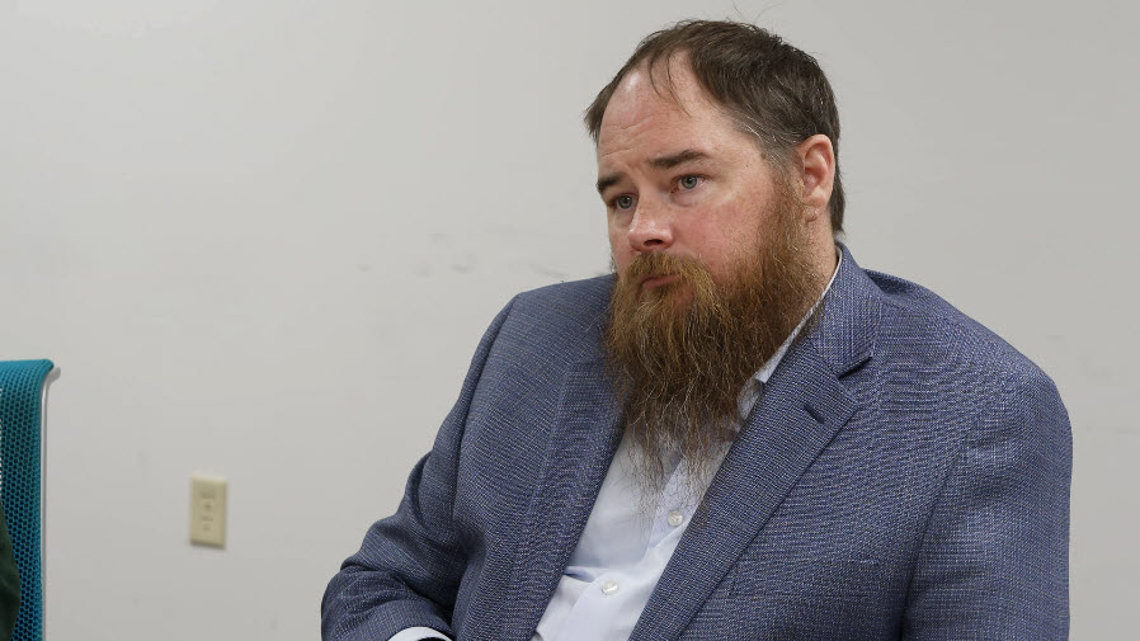
“203 hours, do you think that’s in any way acceptable?” KARE 11 asked.
“Based on the state statute, yes, it is,” Backus replied.
Millions at stake
“How many millions are you billing a year for peer services?” KARE 11 asked.
“How much do you make a year? Backus shot back. “That’s not really your business!”
How much Evergreen bills is the public’s business because it involves taxpayer dollars.
In response to a KARE 11 open records request, the Minnesota Department of Human Services provided Medicaid billing data for Evergreen. It shows between September of 2021 and December of 2023 Evergreen Recovery billed taxpayers for more than $3 million in peer services.

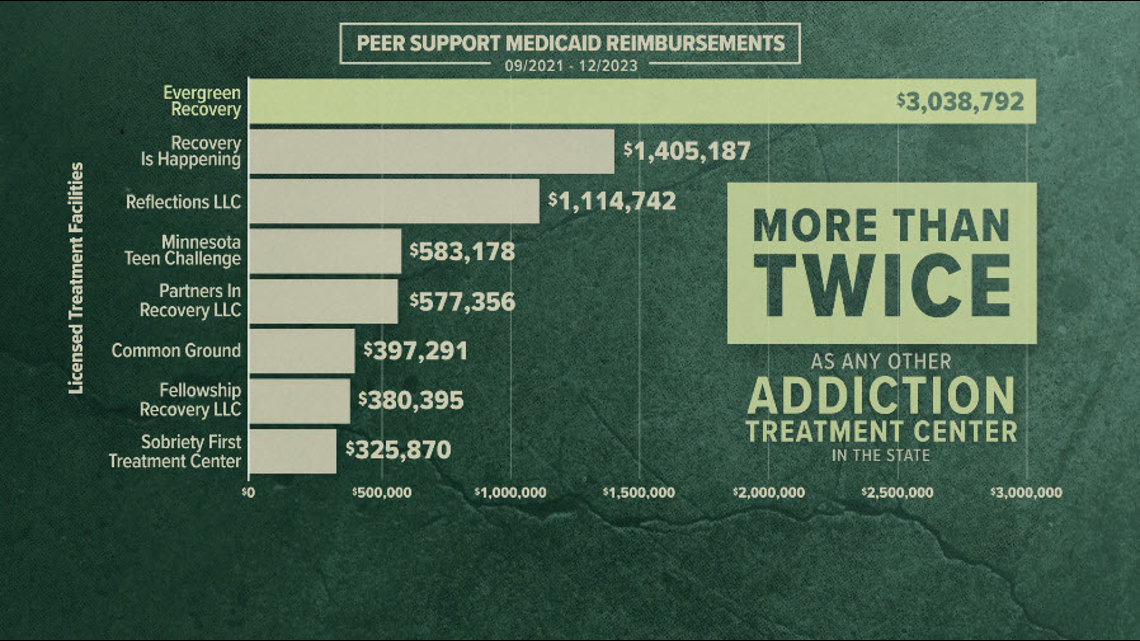
Records show that’s more than twice as much as any other addiction treatment center in the state during the same period.
Even so, Backus defends Evergreen’s practices. “I think you’re just wordsmithing it that one-to-one can be provided to multiple people at the same time.”
So, what does Evergreen’s client Q call the claim he received one-to-one peer service in those three-mile group van rides that allegedly took 45 minutes?
“What would you call this?” KARE 11 asked.
“Falsified records,” he replied.
*Brandon Stahl was a special contributor to this report.
Watch more KARE 11 Investigates:
Watch all of the latest stories from our award-winning investigative team in our special YouTube playlist:
WATCH MORE ON KARE 11+
Download the free KARE 11+ app for Roku, Fire TV, Apple TV and other smart TV platforms to watch more from KARE 11 anytime! The KARE 11+ app includes live streams of all of KARE 11's newscasts. You'll also find on-demand replays of newscasts; the latest from KARE 11 Investigates, Breaking the News and the Land of 10,000 Stories; exclusive programs like Verify and HeartThreads; and Minnesota sports talk from our partners at Locked On Minnesota.
- Add KARE 11+ on Roku here or by searching for KARE 11 in the Roku Channel Store.
- Add KARE 11+ on Fire TV here or by searching for KARE 11 in the Amazon App Store.
- Learn more about the KARE 11+ app for Apple TV in the Apple App Store.
- Learn more about KARE 11+ here.


